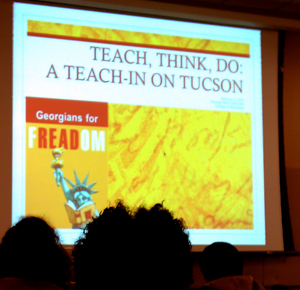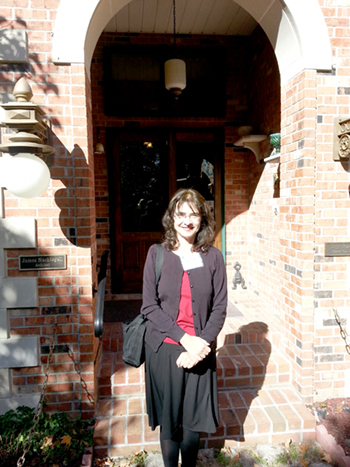 by Mary Grabar. On February 4, 2012, I attended a “Teach-In on Tucson,” at Georgia State University College of Education, which was advertised as being free and open to the public. Dean Randy Kamphaus welcomed 170 participants. According to the College of Education’s website, the purpose of the Teach-In was to “facilitate discussion of curriculum and censorship.” But the discussion focused specifically on lobbying against legislation in the Georgia General Assembly. The event was attended by professors, teachers, students, and professional activists.
by Mary Grabar. On February 4, 2012, I attended a “Teach-In on Tucson,” at Georgia State University College of Education, which was advertised as being free and open to the public. Dean Randy Kamphaus welcomed 170 participants. According to the College of Education’s website, the purpose of the Teach-In was to “facilitate discussion of curriculum and censorship.” But the discussion focused specifically on lobbying against legislation in the Georgia General Assembly. The event was attended by professors, teachers, students, and professional activists.
The Teach-In was devoted to discussing ways to undermine Arizona’s recent legislation (HB 2281) prohibiting the use of curricular materials that “promote the overthrow of the United States government” or “promote resentment toward a race or class of people.” The participants at GSU presented this law as dangerous censorship and discrimination.
Participants listened to a “Spoken Word” performance by Clayton State University education professor Mari Ann Roberts and then listened to a Skype call featuring Jeff Biggers, of the Huffington Post; Debbie Reese, an author of books on social justice; Norma Isela and Jose Gonzalez, Tucson Unified School District teachers, and Nico Dominguez, Tucson Unified School District student.
After picking up free box lunches, participants moved to smaller groups. I attended a session about planning curricula using the book, Rethinking Columbus, which is published by the social justice curriculum company Rethinking Schools. At my table were education students from Georgia State and Clayton State Universities and an employee of the Atlanta History Center, among others. Using the exercises in the book, we discussed classroom strategies for putting Christopher Columbus, Queen Isabella, King Ferdinand, and others on trial for “genocide.”
Another session was called “Hear Our Voices: Letter Writing Session.”
The third, “Precious Knowledge: Censored Books Dialogue,” was dedicated to discussions on the texts affected by the Arizona law.
During the closing session, participants were asked to make public pledges. Among these were: a pledge to learn “indigenous words,” to use social marketing, and to use the banned books in classrooms and on school tours at the Atlanta History Center. Jennifer Esposito, Associate Professor in the Georgia State College of Education, pledged to give her students extra credit for writing letters to Georgia legislators opposing legislation restricting illegal immigration.
Throughout the event, there was no scholarly discussion of the merits of the curriculum materials. There was no objective analysis or allowance made for opposing views. The Arizona legislation was misrepresented. It was also not even read or discussed.
The “Teach-In” was really a rally for activists opposing Georgia’s efforts to slow illegal immigration. The stated goal was to head off Arizona-like legislation in Georgia because “Georgia law follows Arizona law.” The more immediate effort was to stop pending legislation on Georgia immigration law and strategies were discussed.
The program gave thanks to “the generous support of our co-sponsors”: Dean Kamphaus; Dr. Brian Williams and Mr. Bryan Murray of the Alonzo A. Crim Center for Urban Educational Excellence; GSU College of Education professors Barbara Meyers, Dana Fox, Bill Curlette, and Amy Lederberg; Kennesaw State professors Ugena Whitlock, Rebecca Hill, and College of Education Dean Arlinda Eaton; Dr. Stephanie Behm Cross and Ms. Elisa Tate of the GSU Kappa Delta Pi Education Honor Society; Southerners on New Ground, National Association for Multicultural Education, and Metro Atlantans for Public Schools (MAPS).
A number of “supporters” were also listed: 24 individuals from GSU, one from KSU, 3 from MAPS, two from Mundo Hispanico, Jeff Biggers of the Huffington Post, Bill Bigelow of Rethinking Schools, Joan Baptist of WRFG, and Maureen Downey of the Atlanta Journal-Constitution.





